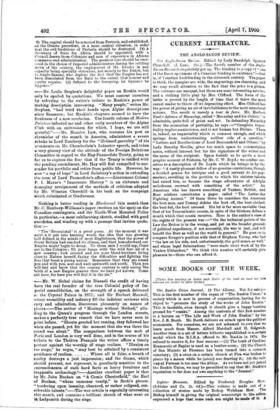CURRENT LITERATURE.
THE ANGLO-SAXON REVIEW,
The 9.1glo-Savon Review. Edited by Lady Randolph Spencer Churchill. (J. Lane. 21s.)—The fourth number of the Anglo. Sa.eon Review is exquisitely got up. The binding is a copy of "one of the finest specimens of a Canevari binding in existence,"Lthat is, of Venetian bookbinding in the sixteenth century. The paper is thick, the margins are wide, the engravings are charming. and we may recall attention to the fact that the price is a guinea. The contents are unequal, but there are some interesting articles, and a striking little play by Mrs. Clifford. The force of the latter is proved by the length of time that it takes the most casual reader to throw off its depressing effect. Mrs. Clifford has the power of giving an air of inevitableness to the most unnatural actions. The result is merely a tour de force. Mr. Herbert Paul's defence of Macaulay, called " Macaulay and his Critici," is admirable, quite full of point and wit. In defending Macaulay from the accusation of partiality, he says :—"Complete impar- tiality implies omniscience, and is not human but Divine. There is, indeed, an impartiality which is common enough, and which springs from understanding neither side of a question." " Letters and Recollections of Lord Beaconsfield and Others," by Lady Dorothy Neville, gives too much space to commonplace notes, without interest but for the signature of the writer and the name of the recipient. Space forbids us to quote a most graphic account of Pretoria, by Mr. C. W. Boyd; we confine our- selves to a description of Dr. Leyds which he brings in by the way: " A vastly pleasant fellow of no genuine convictions, though a decided genius for intrigue and a good servant to his pay- masters, revelling in the position to which his sinister talents had raised him, as became the stage adventurer of Adel/il melodrama crowned with something of the artist." An American who has known something of Yankee, British, and Boer soldiers contributes a paper called " The Latter-day Fighting Animal." Of these three he considers the American the best man, and Tommy Atkins the best off, the best clothed, the best fed, the best amused. His lot is far more enviable than that of his Transatlantic cousin, in spite of the thirteen dollars a month which that cousin receives. Here is the author's view of the rights of the present war :—" On the technical points of the Law the Briton is in the wrong, and yet on the broader grounds of political expediency, if not necessity, the war is just, and will benefit the Boer as well as the world in general." He goes on to compare Kruger's position with that of Brigham Young, who had " the law on his side, and, unfortunately, the gold mines as well," and whose legal fulminations " were made short work of by the Yankee Uitlanders." We think this number will certainly give pleasure to—those who can afford it.






































 Previous page
Previous page